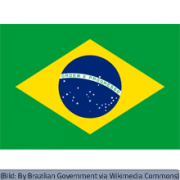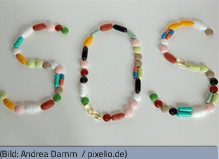Brazil is going its own way in the fight against HIV: on the one hand, this is due to the decision to produce its own HIV copycat products and thus oppose the pharmaceutical industry and, on the other, to the country's free HIV treatment. HIV activist Peter Wiessner about the "Brazil model" and the question of what remains of it.

A few figures are enough to illustrate the HIV threat scenario for Brazil: According to the health authorities, around 720,000 people are currently living with HIV there, and an average of 37,000 new infections were diagnosed each year between 2002 and 2012. As in Germany, the epidemic is concentrated in particularly vulnerable groups. This also includes gay men. At 10.5 per cent, they have the highest HIV rate.
According to the government, the number of new infections is stabilising. Although they are very high compared to our situation, they would certainly be even higher without the government's courageous and early action. From the outset, the most important components of the "Brazilian model" were the fight against patents from the pharmaceutical industry and the involvement of civil society in prevention planning and implementation.
In view of the infection rates, the drugs were simply too expensive for the national health budget, so the government set itself the goal early on of reducing the cost of HIV drugs and making life-sustaining therapy available to everyone. The right to health has been enshrined in Brazil's constitution since 1984. This right includes free access to the public healthcare system. Law No. 9313 from 1996 also regulates the right of all those affected to free access to HIV treatment. Private health insurance companies were forced to cover the costs of HIV medication.
The government also initiated the local production of HIV generic drugs. The country had and still has the necessary capacities thanks to its large pharmaceutical industry, and by 2001, eight of the twelve HIV drugs available at the time had been produced in the country. The emergency was averted thanks to these courageous measures.
Brazil was the first country in the global South to ensure universal access to HIV treatment, making it a role model for developing and emerging countries in particular, which were also unable to afford the expensive treatments. Millions of lives were saved. The fact that this was less expensive than expected is to Brazil's credit.

Between 1996 and 2000, the cost of HIV drugs fell by more than 70 per cent due to competition from generic products. The pharmaceutical industry, however, was outraged. The US government, which has always been a loyal representative of economic interests, complained to the World Trade Organisation in February 2001. The mantra-like argument was that the "undermining" of patent law would lead to the industry abandoning further HIV research projects to the detriment of future generations. But the opposite was the case. Not a single pharmaceutical company has had to file for bankruptcy, and research has been conducted more than ever before since 2001.
However, since the TRIPS agreement was signed in 1996, which among other things clarifies the patent rights of the pharmaceutical industry, the scope for manufacturing generic products has also been limited in Brazil. This is a particular problem for newer generation HIV drugs and modern combination drugs. The patent term is 20 years. As a rule, a preparation can no longer be legally copied once it has been registered with the authorities.

However, in order to patent a drug and maintain a monopoly on it, the industry must prove that it is a genuine innovation. Brazilian civil society and the government have always taken a close look at this. The patent on the HIV drug Tenofovir from the company Gilead, for example, was refused in April 2008 after it was proven that the substance had already been known since the 1980s and was therefore by no means an innovation.
Brazil has done an exemplary job with regard to HIV. But the battle seems to be repeating itself. This is currently particularly evident in the area of innovative hepatitis C drugs, for which record prices are being demanded that cannot be justified: Treatment with the drug sofosbuvir costs around 90,000 dollars, while the real cost of medication is in the region of 150 to 250 US dollars per person, according to calculations by English scientist Andrew Hill. However, the question of whether and how global access to hepatitis C therapies can be ensured and whether the country will once again make a contribution to this is currently completely open.









